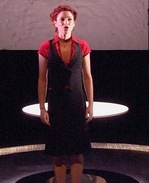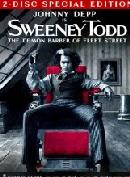HOME PAGE
SITE GUIDE
SEARCH
ADVERTISING AT CURTAINUP
REVIEWS
FEATURES
NEWS
Etcetera and
Short Term Listings
LISTINGS
Broadway
Off-Broadway
NYC Restaurants
BOOKS and CDs
OTHER PLACES
Berkshires
London
California
New Jersey
Philadelphia
Elsewhere
QUOTES
TKTS
PLAYWRIGHTS' ALBUMS
LETTERS TO EDITOR
FILM
LINKS
MISCELLANEOUS
Free Updates
Masthead
Writing for Us
A CurtainUp Los Angeles Review
The Sequence
|
This is the most important science story since the Manhattan Project. No, it's way more important because it affects every single one of us so deeply, so intimately. This is the story. The story. I mean, it gives the Bible a run for its money, you know?— Kellie
|

Karri Krause in The Sequence
|
If it sounds complicated, it is. Paul Mullin does an admirable job of breaking down both sides of the argument, but at the show's core is still a heady, intellectual competition, immersed in scientific jargon that only partially translates. Craig Venter (a compelling Hugo Armstrong) seems unconcerned with the ethical issues involved in using scientific discovery as a means to make money. Francis Collins (a droll William Salyers) appears to be the more admirable of the two, but we quickly learn that in the race for fame nothing is what it appears. Narrating the events, journalist Kellie Silverstein (Karri Krause), takes us on her personal voyage to win a Pulitzer and to decide whether to take a test to determine her future—if she is genetically predisposed to develop breast cancer. Ultimately, although the show has its moments, the presentational narrative makes it hard to invest in the emotional arcs of the characters, and to believe Kellie when she claims "This is the story. The story. I mean, it gives the Bible a run for its money, you know?"
The problem here is, in many ways, the story. Although we are given a science lesson that reminds one of a high school biology class on drugs (Kellie even commands Venter and Collins to spice things up and make it more sexy) it's still hard to fully grasp exactly WHAT will be achieved when the genome is decoded. Perhaps this is why, although the real life race ended fairly recently, most of us have little idea of the events that took place. Venter and Collins have not yet achieved Watson and Crick status.
Although the production design and visual effects are top notch, the characters have trouble breaking through to the audience with their dialogue. Mullin's writing tries to connect us to our narrator, Kellie, and her emotional turmoil over the test for the breast cancer gene, but Krause's delivery is too presentational. Lines that should be thrown away are delivered with such precision that the pace and tone are lost. However, when the show works, it does so brilliantly — instances where Vetner and Collins connect are riveting, and the fact that the story really happened helps engage.
Still, moments that resonate are lost within the science. The script was originally commissioned by the Alfred P. Sloan Foundation Project in Science and Technology. Science and technology are indeed front and center, but as the play itself admits, DNA is never going to be as interesting as the Manhattan Project and nuclear bombs. Kellie even spells it out: "The Manhattan project they understood. The bomb sold itself. In a flash." Although The Sequence tries its best to sell with flashes of light and projections galore, it ultimately falls prey to its own inability to communicate.
|
The Sequence
Directed By: John Langs Written By: Paul Mullin Cast: Hugo Armstrong, Karri Krause and William Salyers Scenic Design: Gary Smoot Lighting Design; Jose Lopez Costume Design: Dianne K. Graebner Sound Design: Robbin E. Broad and Joseph M. Wilbur Running Time: 1 hour 45 minutes, no intermission Dates: Now through November 9, 2008. Thurs/Fri/Sat at 8pm; Sun at 2 pm 70 North Mentor Avenue at Boston Court, Pasadena, CA 91116. Tickets: $32 Tickets: Available online at bostoncourt.org or the box office at 626-683-6883 Reviewed by Ariana Mufson on 10/12/08. |







